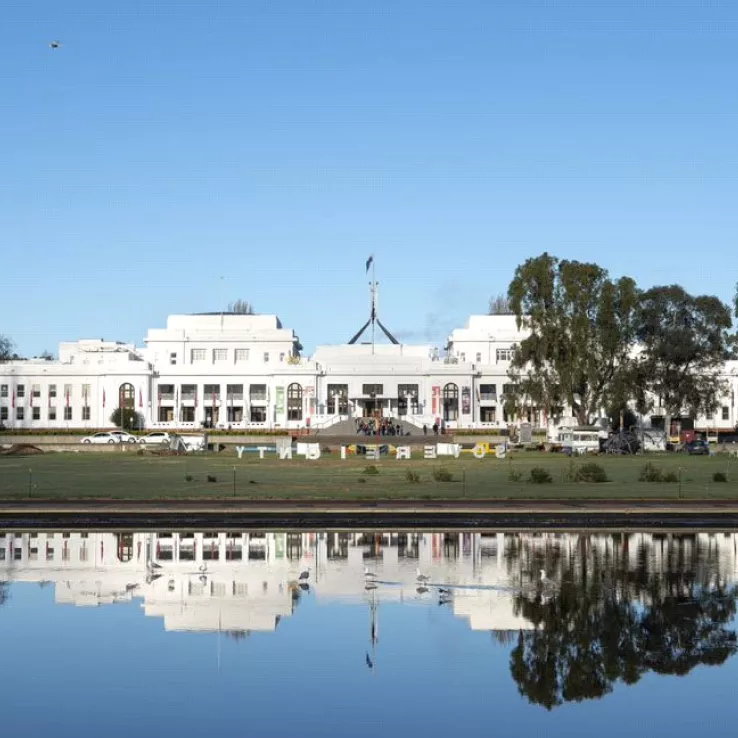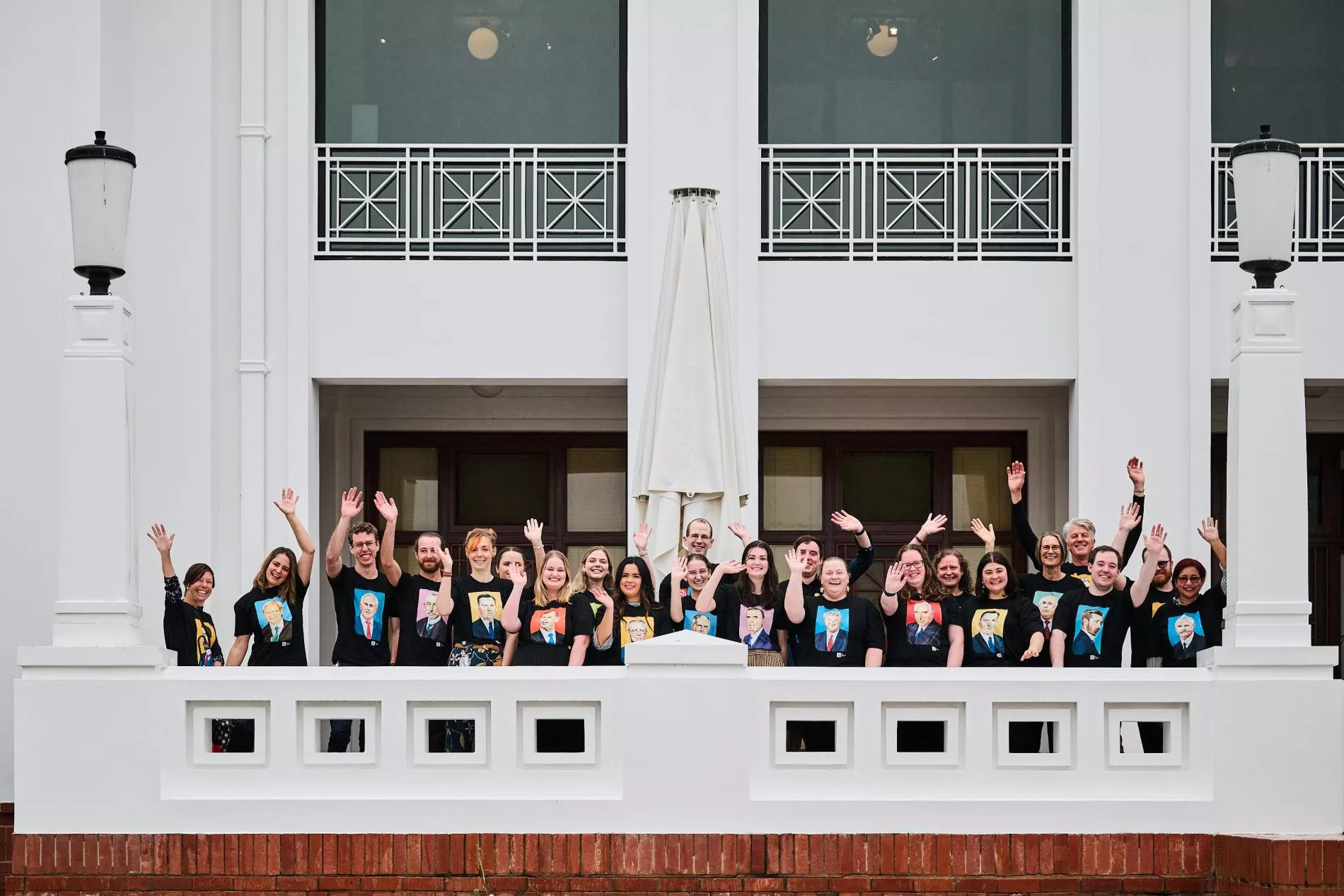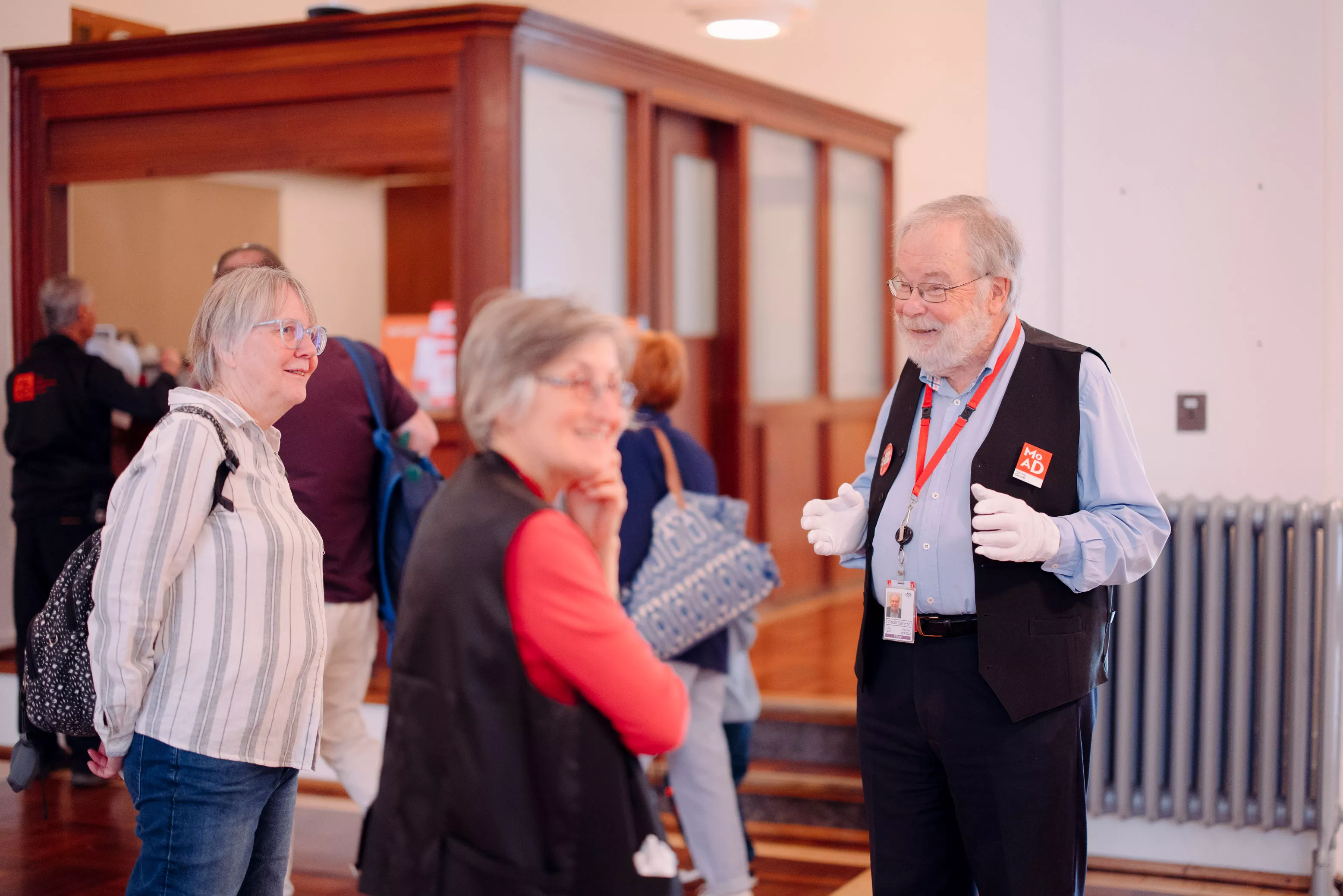Tune in to history in the Senate Chamber
Hear the chamber come alive with the first radio broadcast, a regal opening of parliament, a maiden speech with a youthful agenda and a rowdy final sitting.
Senate chamber audio guide
0:00
[Senators singing]
For auld lang syne, my dear
For auld lang syne
We’ll tak’ a cup o’ kindness yet
For auld lang syne.
For auld lang syne, my dear
For auld lang syne
We’ll tak’ a cup o’ kindness yet
For the sake of auld lang syne
Narrator: In 1988 senators bid a nostalgic farewell to the old Chamber and moved up the hill to their modern and spacious new home in the Australian Parliament House.
The architect of Old Parliament House, John Smith Murdoch, took inspiration from other parliaments when designing the Senate Chamber and positioned the senators in a horseshoe. All were focused on a large central table with the President on a raised dais.
As the Presiding Officer, the President of the Senate directed proceedings from a chair made from Canadian walnut, a gift from that country. The senators in the governing party were on the President’s right, with the opposition directly across the Chamber. Independents and minor parties occupied the curved cross benches.
At the central table the Clerks, surrounded by volumes of Hansard, reference books and timers helped the President keep order while the Hansard reporter rapidly recorded the business of the Chamber overseen by a supervisor.
Notice the rich red used in the leather, carpet and the curtains as you look around the room. This was inherited from the British House of Lords. The timber in the central table, desks, benches and panelling is Australian blackwood and black bean.
The Senate had a reputation for being quite placid when compared to the House of Representatives, but debate could be heated and intense, and the power of the Senate in the legislative process undeniable.
[Members speaking]
Queen Elizabeth II opened a new session of parliament on 15 February 1954. She was the first reigning sovereign to visit Australia and in her address to the politicians, VIPs and official guests reflected warmly on her family’s connection with the building. This historic occasion, like many in the Queen’s tour of Australia, attracted a lot of attention and every seat in the Senate Chamber was occupied.
Queen Elizabeth II: Members of the Senate and Members of the House of Representatives, the first section of the Constitution of the Commonwealth of Australia provides that the legislative power of the Commonwealth shall be vested in a federal parliament, which shall consist of the Queen, a Senate, and a House of Representatives.
It is therefore a joy for me today to address you not as a Queen from far away, but as your Queen and as a part of your parliament ...
When I add to this consideration the fact that I am the first ruling sovereign to visit Australia, it is clear that the events of today make a piece of history which fills me with deep pride and the most heartfelt pleasure ...
I am proud also, speaking as the granddaughter of King George V and the daughter of King George VI, to recall 2 earlier events in the history, the short history, of the Commonwealth of Australia. The first was the opening of the first parliament of the new Commonwealth of Australia in 1901 by my grandfather, then the Duke of Cornwall and York. The second was the opening of this building in 1927 by my father, then the Duke of York. Thus the history of Australia as a nation has a special family significance for me.
Narrator: While a visit from the sovereign to open parliament was a special occasion, Questions without Notice were common practice. On 17 July 1946 the Australian public could hear the Senate live for the first time. At the direction of the Chifley government, proceedings were broadcast by the ABC – the Australian Broadcasting Commission. Amid a forest of microphones, Senator Dorothy Tangney posed a Question without Notice to the Minister for Health and Social Services, Senator Nick McKenna. A Question without Notice is a question without any warning posed to a government minister during Question Time.
President: Senator Tangney.
Senator Tangney: Mr President, I desire to direct the following Question without Notice to the Minister for Health and Social Services. Is the minister aware of the fact that, since the passing of a Hospital Benefits Act, that numerous private hospitals have raised their fees by 2 guineas – the actual amount of the Commonwealth payment – which therefore doesn’t benefit the patient and so defeats the purpose of the legislation?
President: Senator McKenna.
Senator McKenna: Mr President, I am aware that in certain cases prices, ah, increases have taken place. In each of those cases that has been done with the full authority of the Prices Commissioner. It’s recognised by my department, and by the Prices Commissioner also, that the purpose of our legislation, which is to give a benefit to the patient, might easily be defeated if that position were not watched very carefully, and I can assure the honourable senator that there is very close cooperation between my officers and those of the Prices Commissioner to ensure that that does not happen.
Narrator: The first speeches of newly elected senators, formerly known as maiden speeches, were a significant occasion for both the senator and their party. Unlike Question Time and other periods of robust debate, senators do not interject other than to voice the occasional gentle and supportive ‘Hear, hear’.
In 1985 Amanda Vanstone, a Liberal senator from South Australia, delivered an impassioned first speech where she highlighted youth unemployment and the plight of young Australians. At the age of 32, Vanstone was the youngest senator in the Chamber at the time.
Speaker: Senator Vanstone.
Senators: Hear, hear.
Senator Vanstone: Mr [Deputy] President, fellow senators, I rise in this Chamber to make, as you have so kindly drawn to my colleagues’ attention, my first speech. I stand here on the very backbench of the Opposition as a new senator representing South Australia and, albeit I have hundreds of grey hairs, at the age of 32 I am nonetheless the youngest member of this Chamber.
Senators: Hear, hear.
Senator Vanstone: As the youngest senator, Mr Deputy President, I feel compelled to address the disillusionment of young Australians. It is in my view an absolute disgrace that a country with a wealth of opportunities that this country has can tolerate for one minute the degree of disillusionment that young Australians display.
Senators: Hear, hear.
Narrator: Senator Vanstone went on to paint a grim picture of the future for young Australians in a pointed reference to the government’s promises.
Three years later, the parliament was preparing to move up to the new Parliament House and the Senate sat for the final time. The sitting commenced on Thursday 2 June 1988 at 10 am and adjourned the following Friday morning at half-past midnight.
The final moments began with a perfectly ordinary motion from Senator Gareth Evans, Deputy Leader of the Government in the Senate, who proposed that the Senate be adjourned. Things soon descended into a rowdy and nostalgic party.
President: Senator Evans.
Senator Evans: Mr President, I move that the Senate do now adjourn.
Senators: Hear, hear.
President: The question is that the Senate do now adjourn. Those of that opinion say ‘aye’.
Chamber: Aye.
President: Contrary, ‘no’.
President: I think the ayes have it. Order! The Senate stands adjourned until it meets in the Senate Chamber of the new Parliament House at 4 pm on Monday the 22nd of August 1988, in accordance with the resolution moved today, and I declare the Senate Chamber closed.
[The final words of the President are almost drowned out by the sound of party poppers, clapping, shouts and yells, whistles, laughter and general merriment.]
- [1:48] Queen Elizabeth II opens parliament in 1954
- [3:50] First radio broadcast of the Senate Chamber
- [5:33] Senator Amanda Vanstone's first speech in 1985
- [7:07] Last moments in the final sitting of the Senate Chamber
You may also be interested in...

Contact us
Do you have questions or feedback for us?

Getting here and parking
We are located inside Old Parliament House and you can get here by car, bus or bike.

Careers
Join our team and help us tell the story of Australian democracy.

Volunteer
Our volunteers are ambassadors for MoAD, sharing the stories of Old Parliament House.

Collection and heritage
We are a living museum of Australian political and social history.


